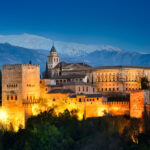UNESCO Celebrates International Day of Multilateralism and Diplomacy for Peace in Doha
The UNESCO Regional Office for the Gulf States and Yemen in Doha commemorated the International Day of Multilateralism and Diplomacy for Peace with a special event at the United Nations House in Doha. The ceremony was attended by the Qatari Ministry of Culture, the Qatari National Commission for Education, Culture and Science, as well as the Green Zone Foundation.
The gathering brought together some 35 diplomats, academics and cultural experts to highlight the role of Arabic as a tool for mutual understanding, regional integration and the preservation of Africa’s common heritage. Initiatives to promote the teaching of Arabic including literature, calligraphy and music were presented, highlighting its influence on social cohesion across the continent.
Signing of Agreement Between UNESCO and Green Zone Foundation

A highlight of the event was the signing of a Letter of Intent between UNESCO and the Green Zone Foundation. The agreement formalizes their collaboration to promote Arabic as a vehicle for intercultural dialogue and peace. It is an important step in efforts to strengthen the presence of Arabic in Africa through innovative educational projects.
Maha Darwish Al Shebani, Director of Public Diplomacy at the foundation, emphasized that this partnership will expand digital initiatives to make Arabic learning more accessible, particularly in non-Arabic-speaking communities.
Digital Innovation for the Arabic Language: The Contribution of Green Zone Foundation

Al Shebani presented the foundation’s technology initiatives to modernize Arabic language teaching. She highlighted the development of interactive digital platforms designed to make language learning more accessible and dynamic, especially for non-native speakers in Africa. These tools aim to break down educational barriers and foster a deeper connection to Arabic culture through innovative methods.
Al Shebani stressed that in a globalized world, the digitalization of Arabic is key to maintaining its relevance among new generations. “Our projects not only teach the language but also incorporate cultural elements such as music, film, and literature, building bridges between diverse communities,” she said.
Qatar and Linguistic Multilateralism

Sheikha Hanouf bint Abdulrahman Al-Thani, Director of the Department of International Organizations at Qatar’s Ministry of Foreign Affairs, underscored the country’s commitment to multilateral diplomacy by supporting UN initiatives and conflict mediation. She highlighted Qatar’s support for Arabic in Africa through institutions such as the Arabic Language Center, Qatar Charity, and Education Above All, which fund schools, teacher training, and educational projects. Additionally, she emphasized the role of cultural media in strengthening intercultural dialogue.
Salah El-Din Zaki Khaled, UNESCO Representative, praised Qatari policies, including Law No. 7 of 2019 to protect Arabic, and tools like the AI platform Fanar. He noted academic contributions from the Doha Institute for Graduate Studies and the Center for Conflict and Humanitarian Studies. Meanwhile, Ali Abdul Razzaq Al Maarifi of the Qatar National Commission detailed initiatives to integrate Arabic into education through innovative methods and promote it in international forums.
The event reinforced the vision that multilateralism and cultural cooperation are essential for a more just and peaceful world, with Qatar playing a key role in this process.



